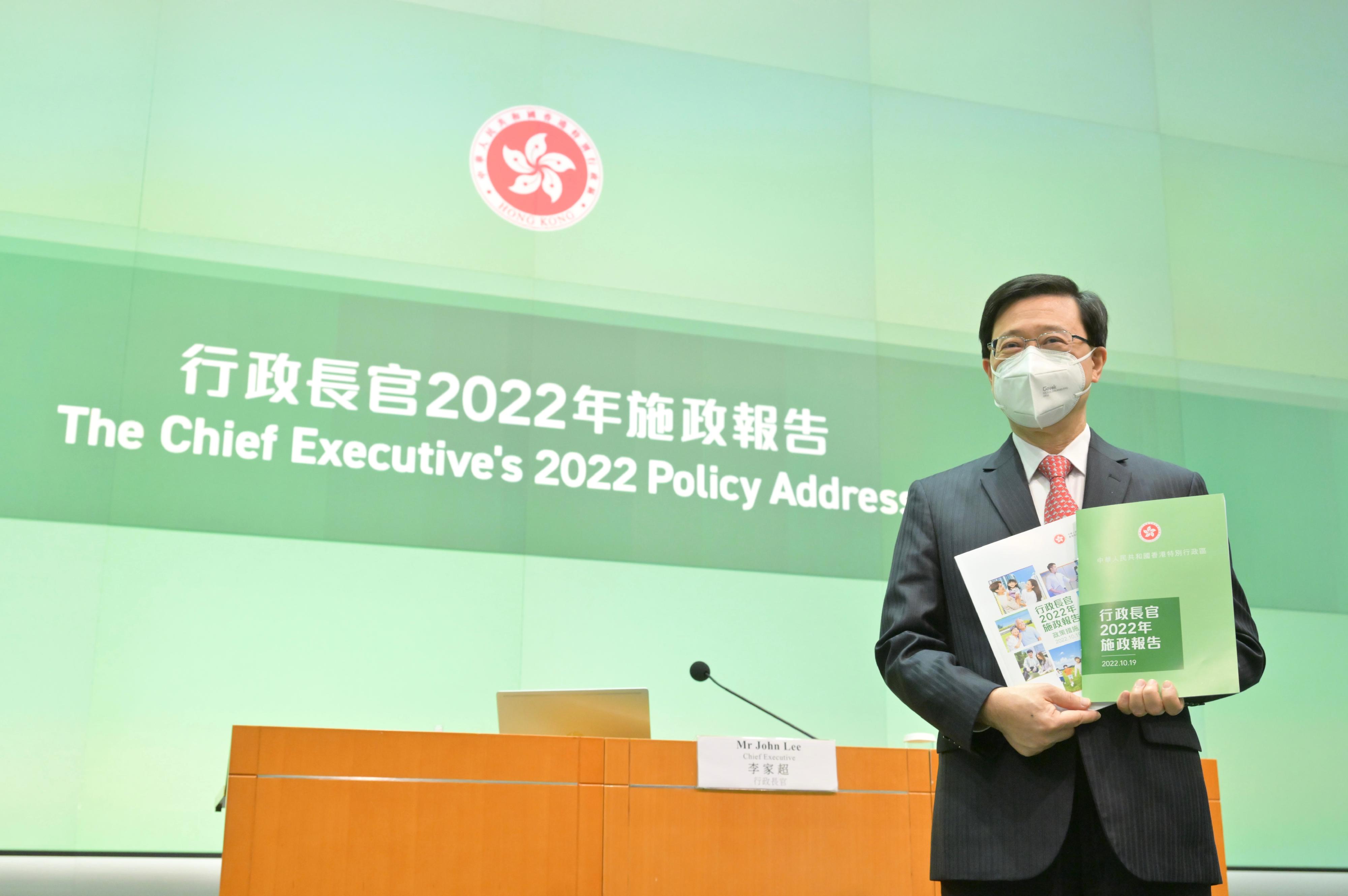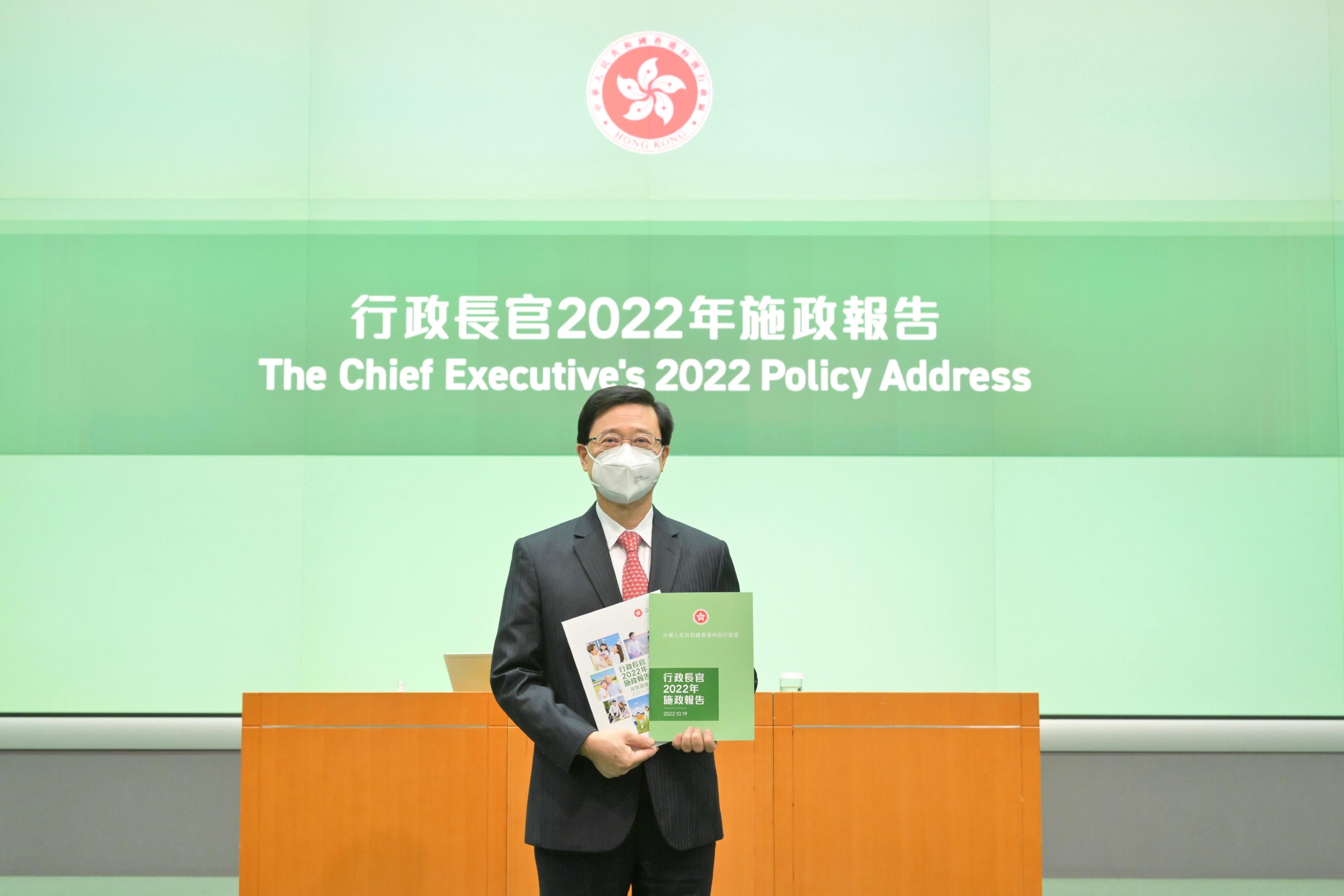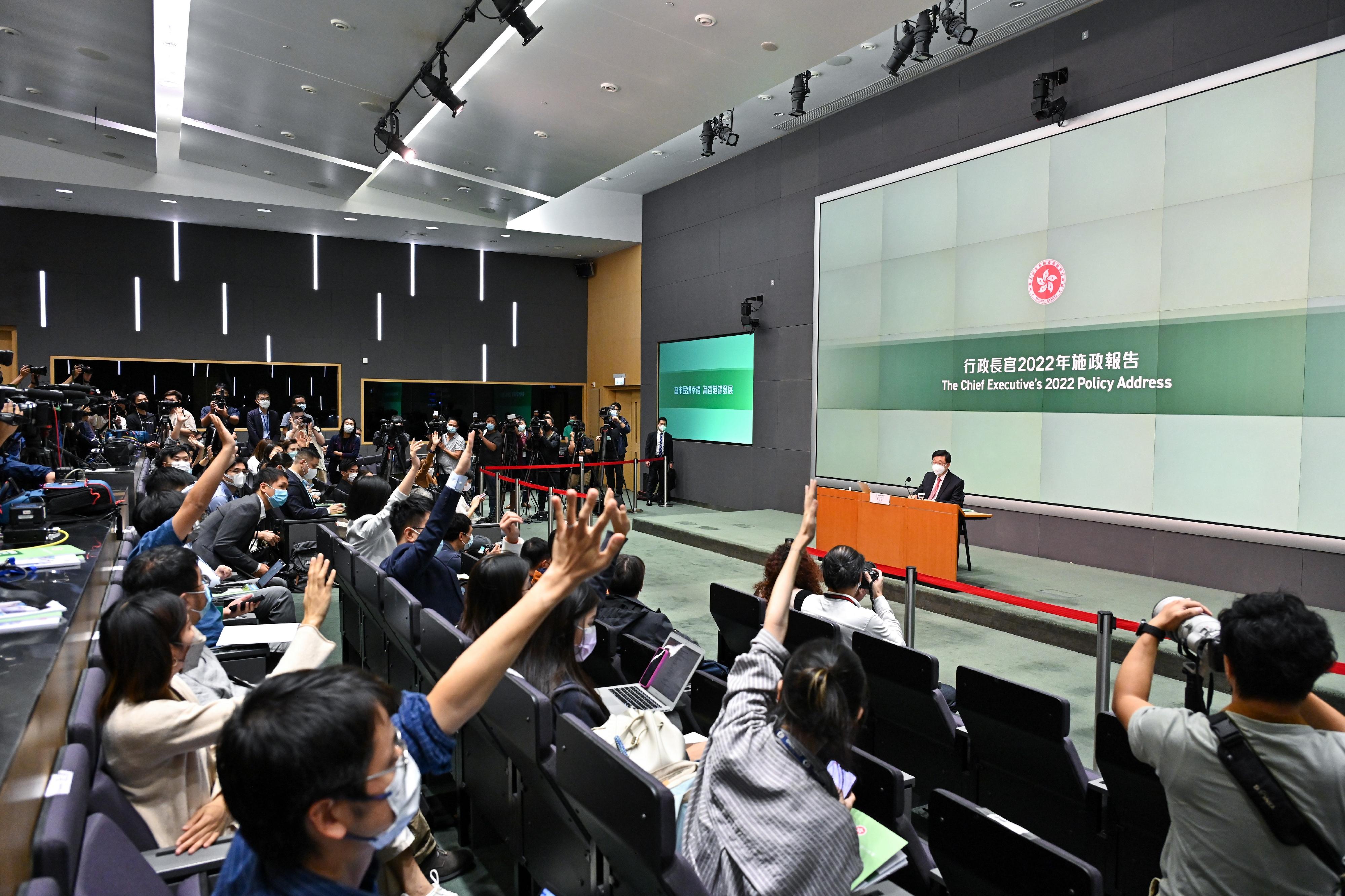Transcript of CE's press conference on "The Chief Executive's 2022 Policy Address" (with photos/video)
******************************************************************************************
Reporter: Mr Chief Executive, I have two questions for you. The first one concerns the Co-Investment Fund that you mentioned in paragraph 26 (of "The Chief Executive's 2022 Policy Address"). You said you want to take $30 billion from the Future Fund to set up a Co-Investment Fund. Can you elaborate on what kind of companies it is hoping to attract? Would it focus on strategic tech companies or would you also target other companies like finance, trade and shipping industries? Would the Hong Kong Monetary Authority be investing in this Co-Investment Fund as well? Question two concerns your talent initiative. In paragraph 29 you announced the stamp duty incentive and the Top Talent Pass Scheme to attract talents. But the Top Talent Pass Scheme is very similar to the ones in countries like Singapore. So is your team just copying from similar foreign schemes, or did you consider making it a scheme that is even more ambitious than our rivals? When the Mainland border is still closed, how effective are these measures compared with the ones in Singapore? Thank you.
Chief Executive: The Co-Investment Fund is set up so as to attract companies to come and also help companies to come, because if the Hong Kong government invests in it, then it will be much easier for that company to also get investment from the private sector. But what are the companies that will be selected? Of course, it will be examined thoroughly and carefully by the board and also a committee which comprises professionals and experts in this area. The Government will be in charge, we will take the lead. The Financial Secretary will be the leader of the company. Of course, at the early stage, I would envisage that some officials from the Hong Kong Monetary Authority may assist in the running of this company. On how, in the long run, it will be run, I would let it run for a while so that it will develop itself. But the main purpose of the Co-Investment Fund is not looking for financial return. That's investment only. So it's not the financial return that we want from the investment, it's more on how that investment can help develop Hong Kong's capabilities, attractiveness and potentials, attracting the right companies to come to Hong Kong which people will know. "Wow, great. This company is well known to so many people of such potentials, it also comes to Hong Kong." So that will increase people's confidence in Hong Kong, and also prove the attractiveness of Hong Kong as a place for businesses to thrive. That's the purpose of the Co-Investment Fund.
In the long run, of course, we want it to develop to an even bigger scale. But one important thing is while we will be very focused on tech companies, we will also be looking at companies which have strategic development value for Hong Kong – if, as I have explained to you, this is a company which, despite not being involved in tech businesses, but by its location in Hong Kong, people will find it a very strong signal, strong message, that Hong Kong is the place for big businesses. We want to create jobs. We want to create opportunities. So that's the main purpose. So the scope will be cast wide; it's not just for tech but then tech companies are, of course, one of the focal areas.
And for the talent attraction schemes, I think all places have designated schemes that will fit their own circumstances and will also be an attractive scheme. I do the same as any other place tries to do. So, I look around all the different places and I also look at our own situation, and I want to extend my net to those I believe are well sought-after talents around the world. That is why I pick the top 100 universities because they are well sought-after around the world, particularly those who are working. For those who graduate from these very famous and successful universities, earning a good salary, attracting them to come to Hong Kong, of course, will be a big asset, which if developed into a critical mass will create a very strong attractiveness and impetus for Hong Kong to develop. So I designed the scheme according to what I think will be the best for Hong Kong. And I actually can tell you that it is quite an open and wide scheme because I really want to attract them within the shortest period of time, so that we can pick up our competitiveness strongly. That is why I make this scheme a two-year scheme to be reviewed further. And it will be reviewed every year so that we can assess whether we should make it even wider, even more open, or have adjustments.
You have mentioned the quarantine arrangement of Hong Kong and also our connectivity with the Mainland. Let's look at it this way. Our connectivity with the world is a long-term thing. There are both short term and long term. In the short term, of course, I have to deal with it in accordance with the strategy I've explained time and again, that I will do it progressively. The direction is clear: to allow maximum freedom and maximum possibility for activities. The direction is clear but I have to do it progressively because this is the Hong Kong situation. But let's face it, we're talking about competitiveness not just in the short run, but in the long run. I'm talking about a two-year scheme and I'm very confident that, well, there will be a lot of connectivity, much more than the present time. So I will not restrict myself to anything that always has to be bothered by the quarantine requirement. So, I will just plan all the strategies so as to allow maximum attractiveness for talents to come to Hong Kong, regardless of the issues that you have raised. And that is the only way we can plan for a successful talent attraction scheme.
Reporter: My first question is about retaining talents. Could you explain further how the authorities will try to retain talents in Hong Kong, as in preventing them from going overseas? And you also talked about attracting talents from overseas. How soon do you think we can see results as a result of the policies? And my second question is about public housing. Do you think the target to reduce the waiting time for a public flat to 4.5 years from six is ambitious or realistic? Has the Government found suitable plots of land to build the 30 000 units of Light Public Housing in the next five years? Thank you.
Chief Executive: I'll answer the second question first. It is ambitious, but it is realistic. In fact, I think if you go through the Policy Address document in detail, there are quite a number of ambitious plans. But it is what I really want to achieve, for the people of Hong Kong, within these five years. So, it is challenging, but I have trust in the united team that I have in the Government, plus the very strong support by civil servants, that we'll be able to deliver. We are committed to this target, which I think may not be something that you would easily see previously, but this is something we want to make happen. And I thank my team for coming up with realistic and practical solutions to address people's crying concern for reducing having to wait for six years for a public housing flat. So, I thank my team but we believe that we can do it because we have already identified the government sites for these 30 000 Light Public Housing flats. We will be using MiC (modular integrated construction) and also we will be doing the building ourselves, so we have control of every part of the scheme. And, also, we will be approaching private developers to see whether they will also have sites to lend us. If the support by the private sector comes strongly, then perhaps we can build more. But at the present moment, we are confident that there are already sufficient sites that can come into this plan.
The second thing, about talents. First of all, we have mentioned about people going to other places from Hong Kong. This happened every now and then in the history of Hong Kong. People leave for their own reasons, but provided we make Hong Kong an attractive place and we make Hong Kong a place where people, when they look at it, they will think, "Ah, this is the place I will come" or "I will come back", that is my mission. So what I intend to do is to create a "Hong Kong future" in these five years in which people can realise their business dreams, their education dreams and their development plans. That is what I'm trying to do. And I know the goals are high but, well, I would progress towards that goal and, if you look at the Policy Address, we are making Hong Kong a better place to live with better healthcare, taking better care of the elderly's needs. We are creating a living environment that will come with not just quantity of houses but quality of living environment. We are making Hong Kong a place where people can be successful in their business ventures. We are making Hong Kong a place which will be known to other parts of the world that this is the place where they can set up their companies and be prosperous. So that is what I am trying to do to make Hong Kong an attractive place.
I have said that we have already very strong DNA as Hong Kong itself, because of its geographical position, because of our population, because of our education, our workforce, and the strength of the things that we have built over the years which make Hong Kong an international financial, shipping, trading centre and an East-meets-West attractive place, and we are making it an IT hub. So there are so many things that we can add in addition to the DNA which is already very strongly attractive.
So I believe by doing all these - and one important thing is we collectively work together - it will make things happen faster and make the voices louder and make the result easier to achieve. So it's is not just the Government - I really hope that all Hong Kong people can take part. That is why I advocate for telling the good Hong Kong story, the true stories for people to know that this is the place that they should come, that they should also come back, and this is the place where they will make their dreams come true.
Reporter: While the new Light Public Housing is proposed, we don't see any solutions specifically to tackle on subdivided flat in this year's Policy Address. While (President) Xi Jinping has put forward that Hong Kong people should live in a better condition, do you have a timetable for the eradication of subdivided flat, or this is not on your list? Thank you.
Chief Executive: You have to, first of all, understand the intention and purpose of the Light Public Housing. It is to address the crying needs of a lot of people who are living in unfavourable conditions, such as subdivided flats. The provision of this Light Public Housing will directly address people who are living in subdivided flats. Of course, the people who are qualified to move into this Light Public Housing, as the Policy Address has explained, are the people who are already waiting in the queue for public housing, and have waited for three years or more. So they are the first (batch of) persons to be benefited from this Light Public Housing. But if there are sufficient supply of housing and affordable rental price, then a lot of people will not have to live in subdivided flats. So, to answer to the problem of subdivided flats, the first thing that we must do, is to provide many more houses, so that these people have a chance to move in. That's the first thing.
The second thing is, some people who are living in subdivided flats, are not people who are, in any way, underprivileged. There are some actually, make use of subdivided flats because that flat may be nearer to his place of work. So there may be some people who are not qualified to move into a public rental house, they prefer living in a location which is close to their working place, or because they have other needs. The first step to do with subdivided flats, is first of all, to ensure people who don't want to live in subdivided flats will get a chance to move out to houses which they find comfortable. That is what I am doing now. This is the critical need.
In the long run, when we have addressed all these crying needs of people in the long queue, then we may look at the subdivided flats holistically again, to see how we can improve the whole thing. Because there will definitely be some people who have chosen to live in a particular flat because of his personal needs, such as (what) I have explained, (being) close to his working place, or other reasons. So it's not a simple thing that the living condition may not be as desirable as we wish they can have, there is also a practical need issue.
(Please also refer to the Chinese portion of the transcript.)
Ends/Wednesday, October 19, 2022
Issued at HKT 21:22
Issued at HKT 21:22
NNNN
Photo
Audio / Video
Press conference on "The Chief Executive's 2022 Policy Address"








